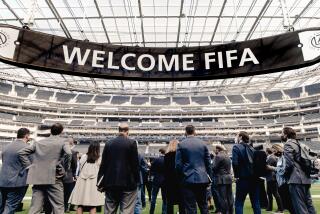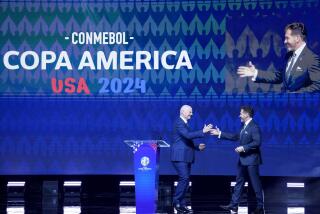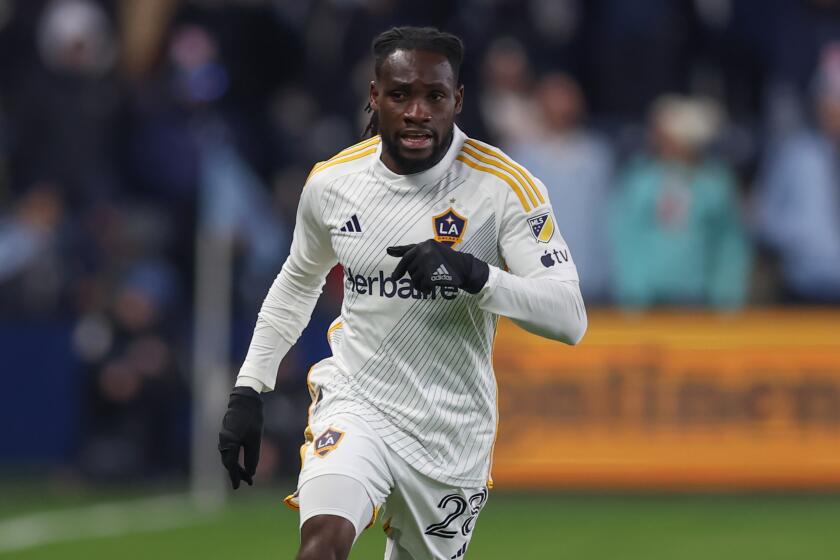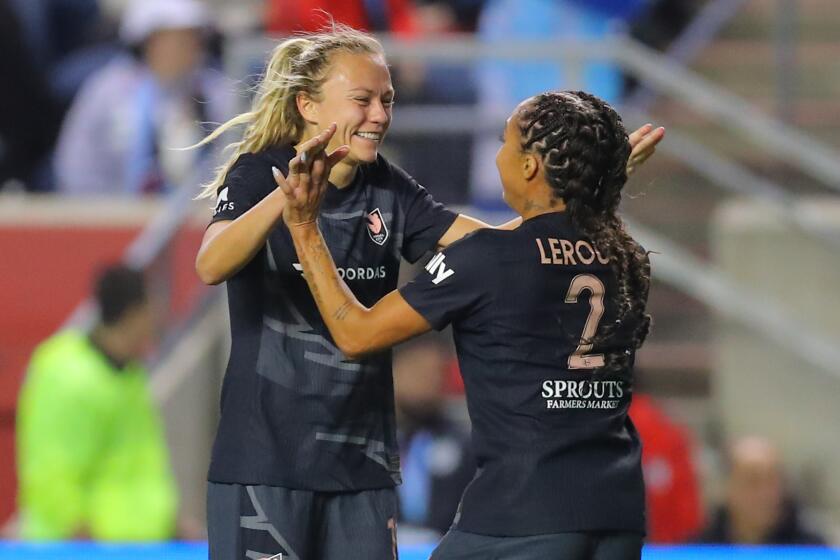Column: World Cup bid should be a lock for North America, but it’s not and here’s why
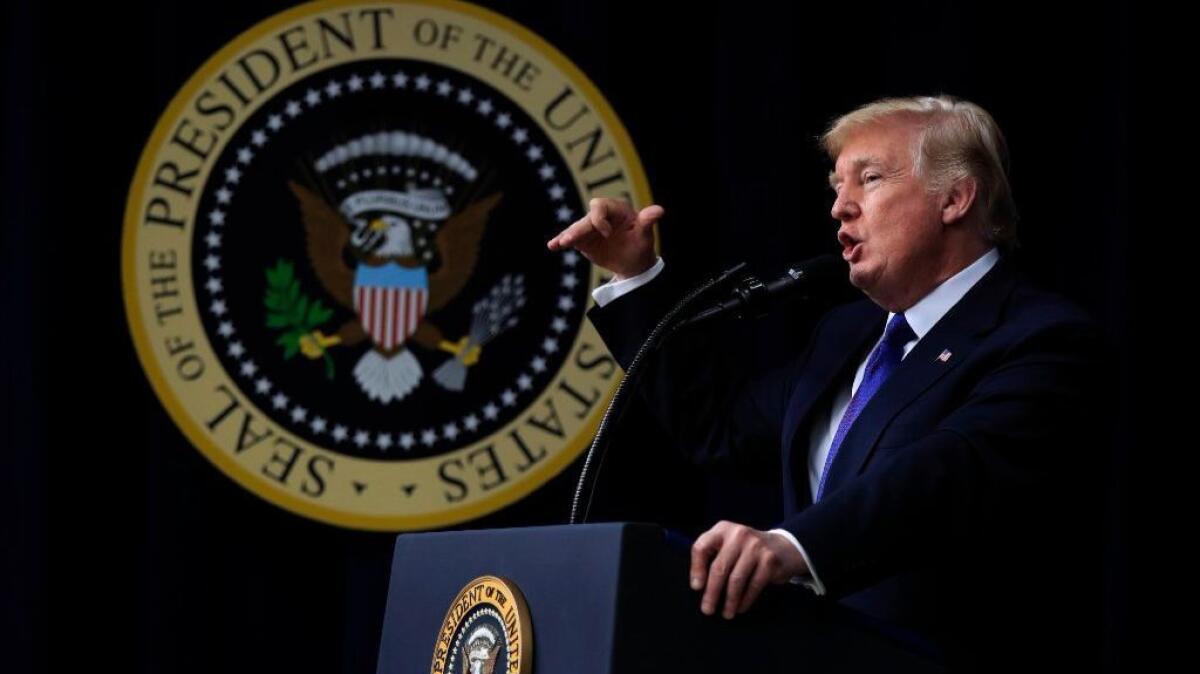
The Los Angeles City Council considered Tuesday a proposal that would have the city seek to host events for the 2026 World Cup. The Rose Bowl in Pasadena and the NFL stadium under construction in Inglewood are also in the running to stage World Cup games.
The only thing they need now is a World Cup. And that’s not the sure thing it appeared to be just a few months ago.
The joint bid by Mexico, Canada and the U.S. to bring soccer’s biggest event back to North America for the first time since 1994 is an impressive one. The three neighbors already have both the infrastructure and the know-how to put on a global event, having combined to stage a dozen major FIFA tournaments.
Morocco, a small North African nation with about as much land and as many people as California, was the only other country to bid for the 2026 World Cup, which will expand to 48 entrants, making it the largest tournament in history.
But just to be sure — and also because its regulations demand it — FIFA will put the matter up for a vote in June. And that could pose a problem for the North Americans.
Last month Steve Goff of the Washington Post reported that people close to the North American bid privately were expressing concern that growing anti-U.S. sentiment around the world has many FIFA nations leaning toward Morocco, which only last week named a chairman to its bid committee, one that still doesn’t have a website.
But the Moroccans may have gotten an unlikely assist from President Trump, who repeatedly has sought a travel ban that would bar citizens from some African countries from entering the U.S., said Nigerians live in huts, then last week reportedly referred to African nations as “shithole countries,” actions that are more likely to help Morocco’s longshot campaign rather than the U.S.-led bid.
“In Africa there’s solidarity,” the president of one soccer federation told the New York Times. “So we feel insulted and not happy. Of course it’s not good for the Americans.”
The African Union has demanded an apology, one the president isn’t likely to make since he denied making the remark. And though Trump, even if he wins re-election in 2020, wouldn’t be in office when the World Cup comes, nations in Africa and elsewhere are beginning to see support for Morocco as a way to express their anger.
Even the participation of Canada and Mexico in the North American bid, the most expansive in history, may do little to soften opposition since voters are aware 60 of the tournament’s 80 games would be played in the U.S.
The deadline for submitting the final bid paperwork is March 16, with an election to select the winner scheduled for June’s FIFA Congress in Moscow. And this year, for the first time, the 207 FIFA-member nations not bidding for the tournament all have votes that count equally, giving members such as the tiny Indian Ocean island of Comoros, which has fewer than 800,000 residents, the same electoral clout as China and India, who have populations of more than 1.3 billion.
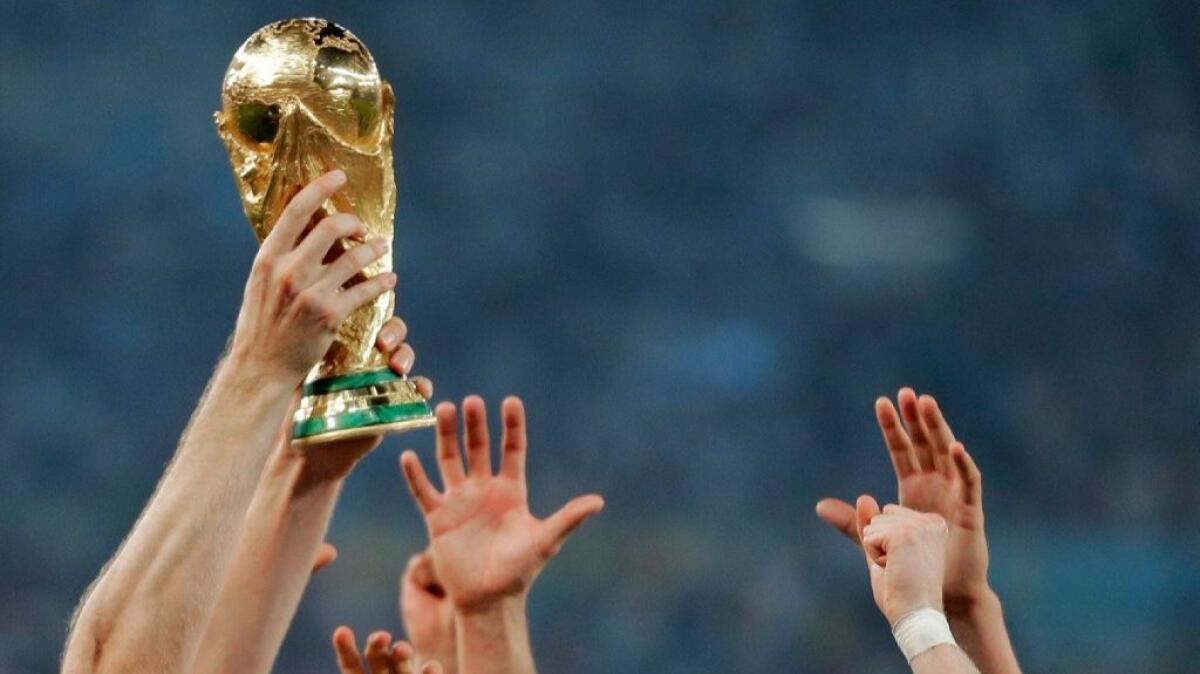
Of graver danger to the North American bid is the fact nations historically vote in blocs — meaning Africa, the largest of FIFA’s six confederations with 57 countries, is likely to cast most if not all of its votes for Morocco. The confederation will meet next month to discuss an endorsement and if it agrees on a unanimous vote, Morocco would have more than half the votes it needs to win.
Several Gulf and Middle Eastern countries also may back Morocco, some for cultural reasons and others such as Syria, Iran, Jordan and Pakistan for political ones.
The North Americans, meanwhile, have been pledged the support of the 14 Oceania countries and are likely to get all 38 votes from CONCACAF, the confederation to which they belong. But South America, which was hit by the indictments of nearly two dozen individuals in the 2015 FIFA corruption case launched by the U.S. Justice Department, could be a problem. For some there, a vote against the U.S.-led bid would serve as payback; Mexican diplomacy may be needed to win their votes.
UEFA, the massive confederation representing the European countries, appears split with some countries such as France and Spain likely to consider Morocco, for ease of travel if nothing else, while others remain firmly aligned with the North Americans.
If it seems like a stretch to consider Morocco over North America, it is.The U.S., Mexico and Canada have combined to host six World Cups — three for men, three for women — including the 1994 event, the most lucrative and best-attended in history. Morocco is currently staging the 16-team African Nations Championship, the largest competition to which it has played host.
FIFA will require stadiums with at least 40,000 seats for all 80 matches of the 2026 World Cup. The U.S. alone has 130 venues that size; Morocco has six, none of them large enough to host the tournament opener or final. It would take an enormous investment for Morocco, bidding for the World Cup for the fifth time, to meet even the most modest FIFA standards.
The commercial and sponsorship opportunities for a North American World Cup also figure to swamp anything the Moroccans could offer.
The U.S. has been down this road before. It was the heavy favorite to win the rights to stage the 2022 World Cup, only to lose to tiny Qatar — a blistering hot Middle Eastern kingdom smaller in size and population than Los Angeles County.
Last week the Moroccans announced they have hired London-based Vero Communications, the firm that pushed Qatar’s successful World Cup campaign across the finish line. Vero also helped Paris land the 2024 Olympic Games, for which Los Angeles also bid.
Follow Kevin Baxter on Twitter @kbaxter11


